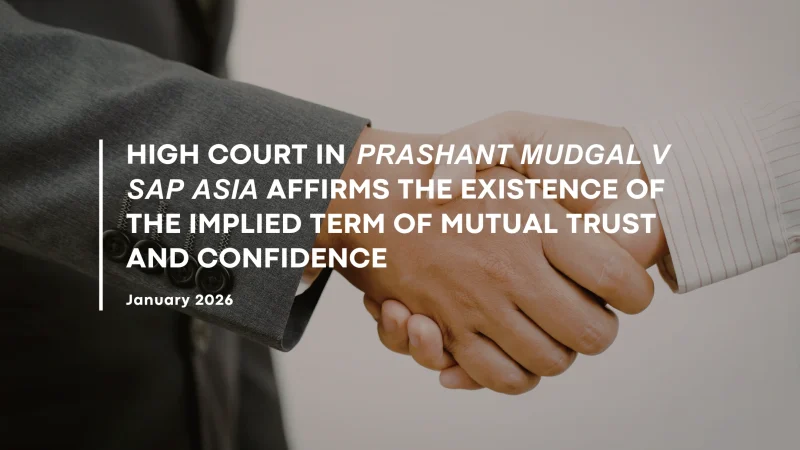White-Collar Crime entails non-violent financial crimes perpetrated by individuals, corporations, or government agents for financial profit. In Malaysia, these crimes comprise fraud, bribery, embezzlement, insider trading, money laundering, and cybercrime. With financial criminal activity becoming more complex, it is important that professionals and businesses grasp the legal landscape of White-Collar Crime to remain compliant and escape legal consequences.
Corporate lawyers play a significant role in representing business organizations and individuals accused of White-Collar Crime and offering legal compliance counsel to corporations in order to avoid such crimes.
Types of White-Collar Crime in Malaysia
1. Fraud and Corporate Fraud
Fraud involves deception for personal or financial gain, including financial statement manipulation, credit card fraud, and investment scams. Corporate fraud occurs when businesses intentionally misrepresent financial health to mislead investors or regulators.
2. Embezzlement and Misappropriation of Funds
This occurs when an employee or official illegally takes funds entrusted to them for personal use. Embezzlement is common in corporate settings, where employees abuse their financial authority.
3. Bribery and Corruption
Bribery involves offering, giving, receiving, or soliciting something of value to influence an official’s actions. In Malaysia, the Malaysian Anti-Corruption Commission (MACC) Act 2009 governs bribery cases.
4. Insider Trading
This occurs when individuals use non-public information about a company to buy or sell stocks, gaining an unfair advantage over other investors. Insider trading is strictly prohibited under Malaysia’s securities laws.
5. Money Laundering
Money laundering is the process of disguising illegal earnings as legitimate income. Malaysia’s Anti-Money Laundering, Anti-Terrorism Financing and Proceeds of Unlawful Activities Act 2001 (AMLA) criminalizes this practice.
6. Cybercrime and Identity Theft
With digital advancements, cybercrime—such as hacking, phishing, and identity theft—has become a major aspect of White-Collar Crime in Malaysia. The Computer Crimes Act 1997 addresses such offenses.
Legal Framework for White-Collar Crime in Malaysia
Several laws govern White-Collar Crime in Malaysia, including:
- Penal Code (Act 574): Covers fraud, criminal breach of trust, and cheating.
- Malaysian Anti-Corruption Commission (MACC) Act 2009: Governs bribery and corruption.
- Securities Commission Malaysia Act 1993: Regulates financial markets and prevents insider trading.
- Anti-Money Laundering Act 2001 (AMLA): Addresses money laundering and terrorist financing.
- Companies Act 2016: Ensures corporate governance and prevents mismanagement.
- Computer Crimes Act 1997: Regulates cybercrime offenses.
Violators of these laws may face severe penalties, including fines, asset forfeiture, or imprisonment.
The Role of Corporate Lawyers in White-Collar Crime Cases
Corporate lawyers are essential in both preventing and defending against White-Collar Crime allegations. Their roles include:
1. Compliance and Risk Management
Corporate lawyers help businesses implement compliance programs to prevent fraudulent activities, ensuring adherence to legal and ethical standards.
2. Internal Investigations
If a company suspects financial misconduct, corporate lawyers conduct internal investigations to identify and address fraudulent activities before legal authorities intervene.
3. Legal Defense for White-Collar Crime Charges
Individuals or businesses accused of White-Collar Crime require skilled legal defense to navigate complex investigations, negotiate settlements, and represent them in court.
4. Liaising with Regulatory Authorities
Corporate lawyers communicate with enforcement agencies like the MACC, Securities Commission, and Bank Negara Malaysia to resolve cases effectively.
How Businesses Can Prevent White-Collar Crime
1. Strengthen Internal Controls
Implement strict financial monitoring, conduct audits, and enforce employee accountability to prevent embezzlement and fraud.
2. Develop a Corporate Ethics Program
Encourage ethical business practices and provide training on fraud detection and prevention.
3. Conduct Regular Audits and Compliance Checks
Regular audits help detect financial irregularities early, minimizing potential risks.
4. Establish a Whistleblower Policy
Encouraging employees to report suspicious activities without fear of retaliation can help prevent White-Collar Crime within organizations.
5. Engage Corporate Lawyers for Compliance
Working with legal experts ensures businesses meet regulatory requirements and avoid legal pitfalls.
Consequences of White-Collar Crime in Malaysia
1. Financial Penalties and Asset Forfeiture
Individuals and companies found guilty of White-Collar Crime may face heavy fines, asset seizures, and repayment of illicit gains.
2. Imprisonment and Criminal Records
Depending on the severity of the offense, perpetrators may receive jail sentences and criminal records that damage their reputation and future employment opportunities.
3. Business Reputation Damage
Companies involved in White-Collar Crime suffer reputational harm, loss of investor confidence, and reduced customer trust, leading to financial losses.
4. Regulatory and Legal Consequences
Businesses may be subjected to government sanctions, legal restrictions, and revocation of licenses for non-compliance.
Final Thoughts: Protecting Against White-Collar Crime
White-Collar Crime poses significant risks to businesses and individuals in Malaysia. Understanding financial crimes, compliance regulations, and legal consequences is essential for corporate governance and risk management.
At TSL Legal, our experienced corporate lawyers provide expert legal defense, compliance solutions, and risk assessments to help businesses prevent and respond to White-Collar Crime. Whether you need legal representation or proactive compliance strategies, our team is ready to assist.
Need legal advice on White-Collar Crime? Contact TSL Legal today!
FAQs
What is the definition of white and blue-collar crime in Malaysia?
White-collar crime refers to non-violent financial offenses committed by professionals or corporations, such as fraud and embezzlement. Blue-collar crime involves physical or violent offenses, such as theft, assault, or vandalism, typically committed by individuals in manual labor industries.
What is considered a white-collar crime?
White-collar crime includes financial and corporate offenses such as fraud, bribery, money laundering, insider trading, and tax evasion. These crimes are typically committed for financial gain through deception or abuse of power.
What are the top 3 white-collar crimes?
The top three white-collar crimes are fraud, bribery and corruption, and money laundering. These crimes are prevalent in corporate and financial sectors, often leading to significant financial losses.
What are the examples of white-collar crimes?
Examples of white-collar crimes include corporate fraud, insider trading, embezzlement, cybercrime, identity theft, and intellectual property theft. These crimes often involve deception or manipulation for financial benefit.
What is the difference between white-collar and blue-collar crime?
White-collar crimes are non-violent financial offenses committed by professionals or businesses, whereas blue-collar crimes involve physical or violent acts such as robbery, burglary, or assault. White-collar crimes often require legal and financial expertise, while blue-collar crimes are typically more direct and immediate.
How to detect white-collar crime?
White-collar crime can be detected through internal audits, forensic accounting, whistleblower reports, financial discrepancies, and unusual transaction patterns. Regular compliance checks and employee monitoring also help in early detection.
What is the profile of a white-collar criminal?
A typical white-collar criminal is a professional or executive in a corporate setting, often well-educated, financially motivated, and in a position of trust. They exploit their knowledge of financial or legal systems to commit crimes without direct violence.
Why is it called a blue-collar?
The term “blue-collar” originates from the early 20th century when manual workers wore blue denim or work shirts, which were durable and concealed dirt from labor-intensive jobs.
What is a pink-collar crime?
Pink-collar crime refers to financial or corporate crimes typically committed in lower-level administrative or service-oriented jobs, such as embezzlement by secretaries, payroll fraud, or small-scale financial misconduct.
What happens to white-collar criminals?
White-collar criminals may face fines, imprisonment, asset seizures, and professional disqualification. However, penalties vary based on the severity of the crime, and some offenders negotiate settlements to avoid lengthy prison terms.
What are the causes of blue-collar crimes?
Blue-collar crimes are often driven by poverty, lack of education, unemployment, and social inequality. In some cases, desperation and lack of access to legal financial opportunities push individuals toward criminal activities.
This article is intended to provide general information only and does not constitute legal advice. It should not be used as a substitute for professional legal consultation. We recommend seeking legal advice before making any decisions based on the information available in this article. Tan, Siew & Lee (TSL Legal) fully disclaims responsibility for any loss or damage which may result from relying on this article.

